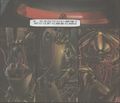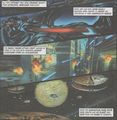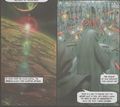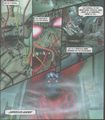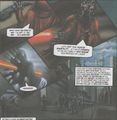Cylons (TOS)
More languages
More actions
- This article describes the robotic creations of a reptilian race from the Original Series. For the Cylons of the Re-imagined Series, see Cylons (RDM). For Cylons depicted in the spin-off Galactica 1980, see Cylons (1980).
The Cylons are entirely composed of robots, originally the creation of a reptilian race that were also known as Cylons.
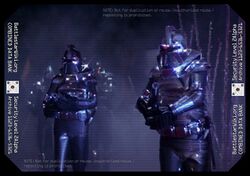
Both types of Cylons shared a home, also known as "Cylon", prior to the beginning of the Thousand Yahren War (TOS: "Saga of a Star World") in the Cyranus Galaxy (TOS: "The Long Patrol").
Reptilian Cylons
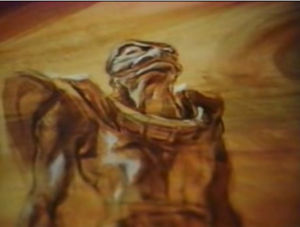
Originally, the reptilian, serpent (Experiment in Terra Telemovie) Cylons created a race of robots to service their needs (TOS: "Saga of a Star World"). According to Apollo, the Cylons discovered humanity. Having determined humans to be the most practical form of creature in their system and crafted robotic creations that mimicked their form. However their creations were made bigger and stronger than humans with interchangeable parts that allow the robots to live forever (TOS: "Saga of a Star World").
The reptilian Cylons allowed themselves to be overcome by their own technology (TOS: "War of the Gods, Part II") upon the creation of the Imperious Leader (Experiment in Terra Telemovie). The robotic Cylons became an organized war machine bent on exterminating life in the galaxy after the creation of the Imperious Leader, who had a slight error in its programming (Experiment in Terra Telemovie). [1] Despite the fact that the reptilian Cylons had long since been wiped out, their robotic creations still bear their name (TOS: "Saga of a Star World"). The term has come to almost exclusively describe the robotic antagonists of the Colonials.
Robotic Cylons
Under the robotic Cylons, they began expanding their sphere of influence, creating what Commander Adama calls "the Alliance" (TOS: "Saga of a Star World"). The Cylons' goal is to strive to achieve "eternal perfection and order" throughout the known galaxy, although they haven't thought much (or at all) beyond that point (The Return of Starbuck).
Centurions appear to be incapable of acting independently, having to refer to "the manual" in order to determine courses of action. Failing that, Centurions often take votes when consensus isn't clear. In addition, they do not appear to have much information on humans, outside of the different genders and general language (The Return of Starbuck). In comparison, the IL-series has more human qualities and emotions ("Lost Planet of the Gods, Part II", "The Young Lords"), although the Centurions are apparently able to emulate emotions and human qualities, such as freedom of choice and loyalty as exemplified by Cyrus (The Return of Starbuck).
Cylon Society
There are five types of Cylons:
- Imperious Leader: controls all Cylon forces and rules the empire. The Imperious Leader is distinguished by taking on an appearance meant to resemble the reptilian Cylon race.
- IL-series (or the "IL group"): Robots that typically take on the administrative duties of the Cylon Empire.
- Command Centurion: Robots with gold plated armor that are analogous with commanders in the Colonial Military.
- Cylon Centurions: These robots are the chrome plated foot soldiers, pilots, and labor force for the Cylon Empire.
- Cylon "civilians": According to Colonel Tigh, he picks up civilian transmissions of a Cylon nature on Gamoray (TOS: "The Living Legend, Part I").
Cylon craft
There are three known Cylon spacecraft:
- Basestar: Capital ships of the Cylon military force, analogous to the Colonial battlestar.
- Raider: The primary fighter of the Cylon forces, manned by two pilots and a ship commander.
- Freighter: Ships used throughout the Cylon sphere of influence to provide fuel. May be used to support an offensive operation, as demonstrated at the Battle of Cimtar (TOS: "Saga of a Star World").
Cylon history
The Thousand Yahren War
- Main Article: Thousand Yahren War
The Thousand Yahren War between the humans of the Twelve Colonies and the Cylons began when the Colonials liberated the Hasari from Cylon rule. The Cylons then viewed humanity as a threat to their Empire and proceeded to attack Colonial installations.
The Cylons and the humans fought for roughly one thousand yahren, with losses on both sides.
The final end to the war occurred after the Cylons proposed peace through the mediation of Baltar, a member of the Quorum of Twelve. However, instead of concluding peace, the Cylons destroyed the human Battlestar force in the Battle of Cimtar and also attacked the Colonies, killing most inhabitants. Baltar, who had intended to use the Cylons to subjugate his colony under his rule, saw his colony destroyed to and barely escaped execution. (TOS: "Saga of a Star World")
Cylon pursuit of the Colonial Fleet
The "rag-tag, fugitive fleet", being led by the last known surviving battlestar, Galactica, flees their homeworlds, avoiding the Cylon genocidal attacks.
Sparing Baltar's life, the newly ascended Imperious Leader gives Baltar the command of three basestars and a cogitator, Lucifer (Saga of a Star World, Lost Planet of the Gods, Part I). With Baltar pursuing the Fleet, Galactica and the 220 ships she leads from their aggressors avoid Cylon death traps, such as those on Arcta (the "Ravashol pulsar"), and all out attacks (e.g. Battle of Gamoray and the events of "Fire in Space").
Eventually, a daring, successful attack on a lone basestar leads Adama to believe that they may have outwitted the Cylons -- who have, apparently, spread their resources thin in an attempt to locate the remaining humans (TOS: "The Hand of God").
Cylons in other media
In the Berkley novelizations for the Original Series, which Battlestar Wiki treats as non-canonical separate continuity sources, the Cylons' status in the Cylon Empire is determined by the number of brains they possess.
Centurions start off with one brain, but can achieve a "second brain" status. The Imperious Leader itself achieves a third brain status.
Achieving a second or third brain status resorts in the Cylon becoming a "reptilian sort of beast" mentally.[2]
Cylon customs
Cylons have various customs in their society. One such custom is having both an official name and a secret name. Official names are used when communicating to non-Cylons and it is considered humiliating if a Cylon's secret name is learned by outsiders. Further, the secret name is part of the secret sector of Cylon language.[3]
Lucifer, despite not being an actual Cylon in the novelizations but rather a robotic construct, is permitted to adopt this custom. In his conversation with Baltar, Lucifer informs him that "Lucifer" is actually an acronym of his secret name.[3]
Cylon constructs
In the novelizations, Lucifer is a Cylon construct. He is considered an "ambulatory cybernetic sentience" and is the result of Cylons' developments into different technologies during the Thousand Yahren War. Further, Lucifer claims that he can manufacture machines and that he has a soul, as he was able to create his own personality.[4]
Cylon History
The Realm Press comic series gives a backstory to the Cylons in the 1999 Tourbook.
- Cylon Origin
-
Cylon Origin 1
-
2
-
3
-
4
-
5
-
6
-
7
-
8
-
9
-
10
-
11
-
12
-
13
Notes
- Both the Gold Command Cylon Centurions and the Silver Cylon Centurions were voiced with an EMS Vocoder 2000 [1] (verified in the book 'How to Wreck a Nice Beach' by Dave Tompkins) by voice-actor Michael Santiago.
References
- ↑ Count Iblis's appearance and his subsequent encounter with Lord Baltar in the Prison Barge's brig suggests (without further substantiation) that the revolt of the robotic Cylons was organized by Iblis over a thousand yahren prior to the Cylon holocaust of the Twelve Colonies (TOS: "War of the Gods, Part II"). Given that his voice patterns seem to have been imprinted into what Iblis called "machine Leader" (TOS: "War of the Gods, Part II") and the apparent onset of the Leader's creation causing the slaughter of both the original Cylons and all human life in the "star system" (Experiment in Terra Telemovie), this connotation seems to have been further substantiated.
- ↑ Thurston, Robert (September 1979). Battlestar Galactica 3: The Tombs of Kobol. Berkley Books, p. 3.
- ↑ 3.0 3.1 Ibid., 4
- ↑ Ibid., 6-7.




